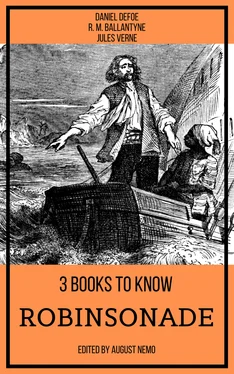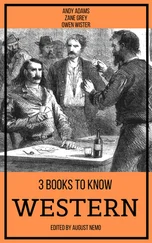We were indeed much interested in this account, and I could not help again in my heart praying to God to prosper those missionary societies that send such inestimable blessings to these islands of dark and bloody idolatry. The teacher also added that the other tribes were very indignant at this one for having burned its gods, and threatened to destroy it altogether; but they had done nothing yet. “And if they should,” said the teacher, “the Lord is on our side; of whom shall we be afraid?”
“Have the missionaries many stations in these seas?” inquired Jack.
“Oh yes. The London Missionary Society have a great many in the Tahiti group, and other islands in that quarter. Then the Wesleyans have the Feejee Islands all to themselves, and the Americans have many stations in other groups. But still, my friend, there are hundreds of islands here, the natives of which have never heard of Jesus, or the good word of God, or the Holy Spirit; and thousands are living and dying in the practice of those terrible sins and bloody murders of which you have already heard. — I trust, my friends,” he added, looking earnestly into our faces —“I trust that if you ever return to England, you will tell your Christian friends that the horrors which they hear of in regard to these islands are literally true, and that when they have heard the worst, the ‘half has not been told them;’ for there are perpetrated here foul deeds of darkness of which man may not speak. You may also tell them,” he said, looking around with a smile, while a tear of gratitude trembled in his eye and rolled down his coal-black cheek —“tell them of the blessings that the Gospel has wrought here!”
We assured our friend that we would certainly not forget his request. On returning towards the village, about noon, we remarked on the beautiful whiteness of the cottages.
“That is owing to the lime with which they are plastered,” said the teacher. “When the natives were converted, as I have described, I set them to work to build cottages for themselves, and also this handsome church which you see. When the framework and other parts of the house were up, I sent the people to fetch coral from the sea. They brought immense quantities. Then I made them cut wood, and piling the coral above it, set it on fire.
“‘Look! look!’ cried the poor people in amazement; ‘what wonderful people the Christians are! He is roasting stones! We shall not need taro or bread-fruit any more; we may eat stones!’
“But their surprise was still greater when the coral was reduced to a fine, soft, white powder. They immediately set up a great shout, and mingling the lime with water, rubbed their faces and their bodies all over with it, and ran through the village screaming with delight. They were also much surprised at another thing they saw me do. I wished to make some household furniture, and constructed a turning-lathe to assist me. The first thing that I turned was the leg of a sofa, which was no sooner finished than the chief seized it with wonder and delight, and ran through the village exhibiting it to the people, who looked upon it with great admiration. The chief then, tying a string to it, hung it round his neck as an ornament! He afterwards told me that if he had seen it before he became a Christian, he would have made it his god!”
As the teacher concluded this anecdote we reached his door. Saying that he had business to attend to, he left us to amuse ourselves as we best could.
“Now, lads,” said Jack, turning abruptly towards us, and buttoning up his jacket as he spoke, “I’m off to see the battle. I’ve no particular fondness for seein’ bloodshed; but I must find out the nature o’ these fellows and see their customs with my own eyes, so that I may be able to speak of it again, if need be, authoritatively. It’s only six miles off, and we don’t run much more risk than that of getting a rap with a stray stone or an overshot arrow. Will you go?”
“To be sure we will,” said Peterkin.
“If they chance to see us, we’ll cut and run for it,” added Jack.
“Dear me!” cried Peterkin; “you run! I thought you would scorn to run from any one.”
“So I would, if it were my duty to fight,” returned Jack coolly; “but as I don’t want to fight, and don’t intend to fight, if they offer to attack us I’ll run away, like the veriest coward that ever went by the name of Peterkin. So come along.”
A STRANGE AND BLOODY Battle — The Lion Bearded in His Den — Frightful Scenes of Cruelty, and Fears for the Future.

WE HAD ASCERTAINED from the teacher the direction to the spot on which the battle was to be fought, and after a walk of two hours, reached it. The summit of a bare hill was the place chosen; for, unlike most of the other islanders, who are addicted to bush-fighting, those of Mango are in the habit of meeting on open ground. We arrived before the two parties had commenced the deadly struggle, and creeping as close up as we dared among the rocks, we lay and watched them.
The combatants were drawn up face to face, each side ranged in rank four deep. Those in the first row were armed with long spears; the second with clubs to defend the spearmen; the third row was composed of young men with slings; and the fourth consisted of women, who carried baskets of stones for the slingers, and clubs and spears with which to supply the warriors. Soon after we arrived, the attack was made with great fury. There was no science displayed. The two bodies of savages rushed headlong upon each other and engaged in a general melee, and a more dreadful set of men I have never seen. They wore grotesque war-caps, made of various substances and decorated with feathers. Their faces and bodies were painted so as to make them look as frightful as possible; and as they brandished their massive clubs, leaped, shouted, yelled, and dashed each other to the ground, I thought I had never seen men look so like demons before.
We were much surprised at the conduct of the women, who seemed to be perfect furies, and hung about the heels of their husbands in order to defend them. One stout young woman we saw, whose husband was hard pressed and about to be overcome: she lifted a large stone, and throwing it at his opponent’s head, felled him to the earth. But the battle did not last long. The band most distant from us gave way and were routed, leaving eighteen of their comrades dead upon the field. These the victors brained as they lay; and putting some of their brains on leaves, went off with them, we were afterwards informed, to their temples to present them to their gods as an earnest of the human victims who were soon to be brought there.
We hastened back to the Christian village with feelings of the deepest sadness at the sanguinary conflict which we had just witnessed.
Next day, after breakfasting with our friend the teacher, we made preparations for carrying out our plan. At first the teacher endeavoured to dissuade us.
“You do not know,” said he, turning to Jack, “the danger you run in venturing amongst these ferocious savages. I feel much pity for poor Avatea; but you are not likely to succeed in saving her, and you may die in the attempt.”
“Well,” said Jack quietly, “I am not afraid to die in a good cause.”
The teacher smiled approvingly at him as he said this, and after a little further conversation, agreed to accompany us as interpreter — saying that although Tararo was unfriendly to him, he had hitherto treated him with respect.
We now went on board the schooner, having resolved to sail round the island and drop anchor opposite the heathen village. We manned her with natives, and hoped to overawe the savages by displaying our brass gun to advantage. The teacher soon after came on board, and setting our sails, we put to sea. In two hours more we made the cliffs reverberate with the crash of the big gun, which we fired by way of salute, while we ran the British ensign up to the peak and cast anchor. The commotion on shore showed us that we had struck terror into the hearts of the natives; but seeing that we did not offer to molest them, a canoe at length put off and paddled cautiously towards us. The teacher showed himself, and explaining that we were friends and wished to palaver with the chief, desired the native to go and tell him to come on board.
Читать дальше













